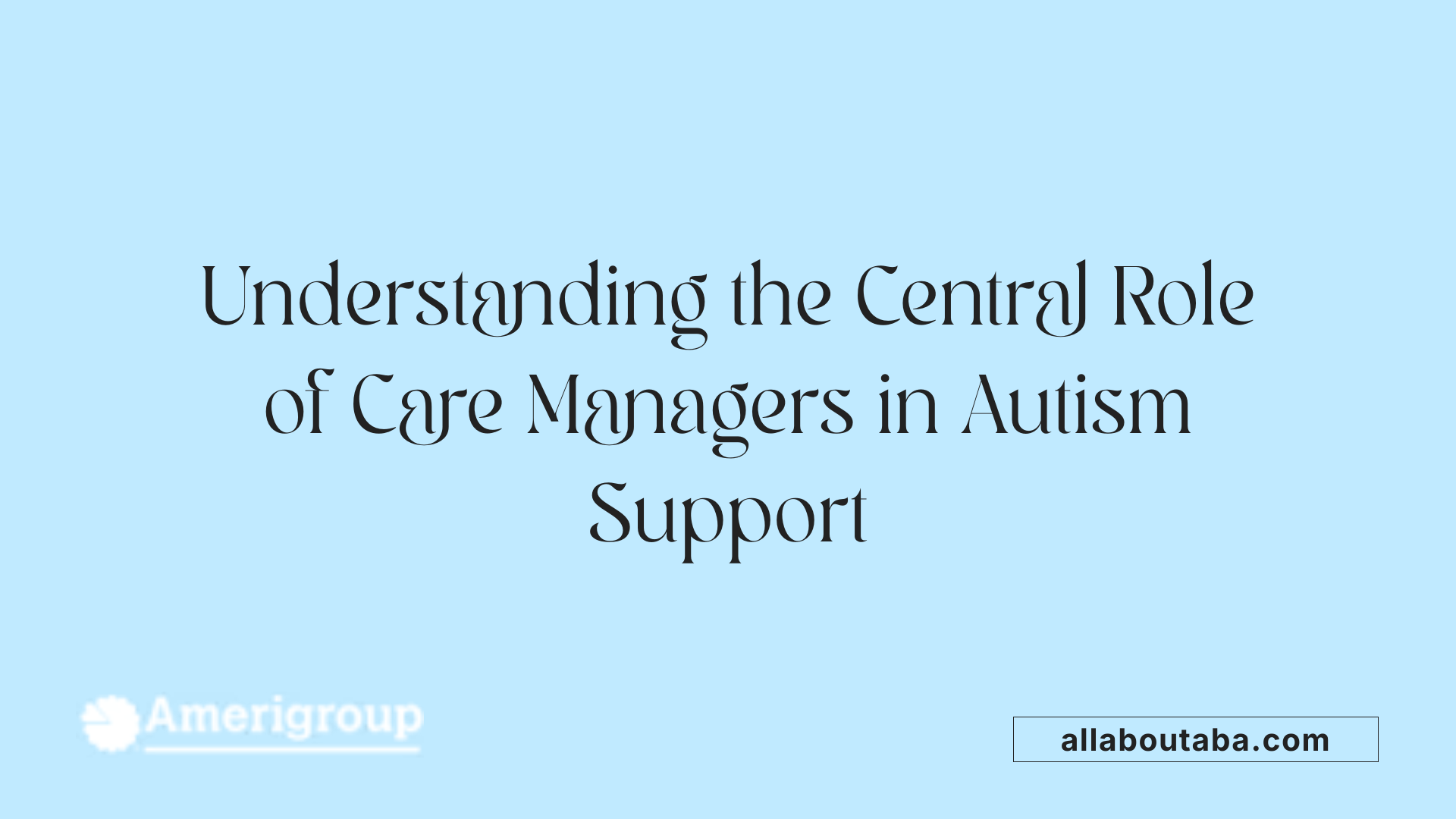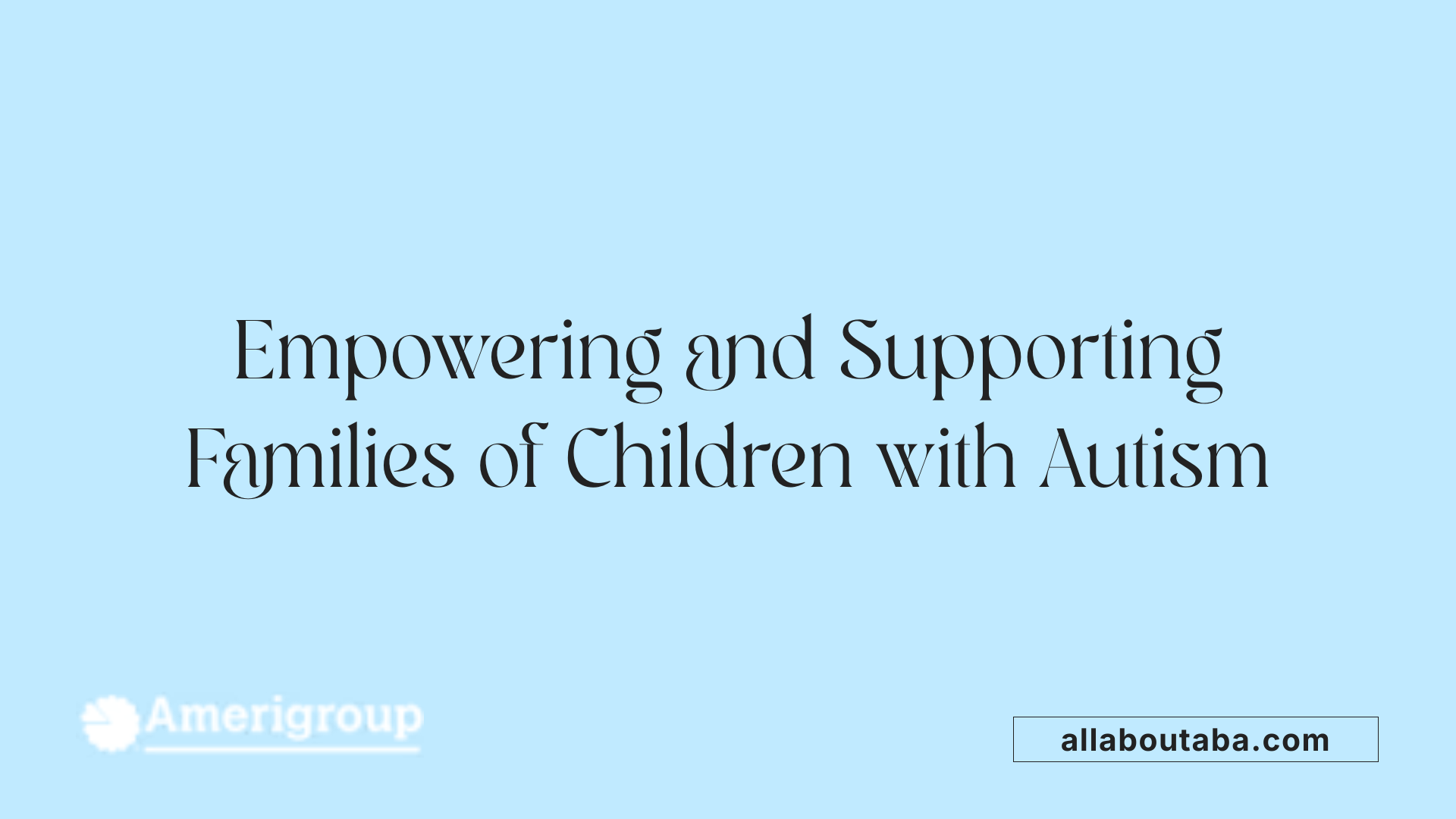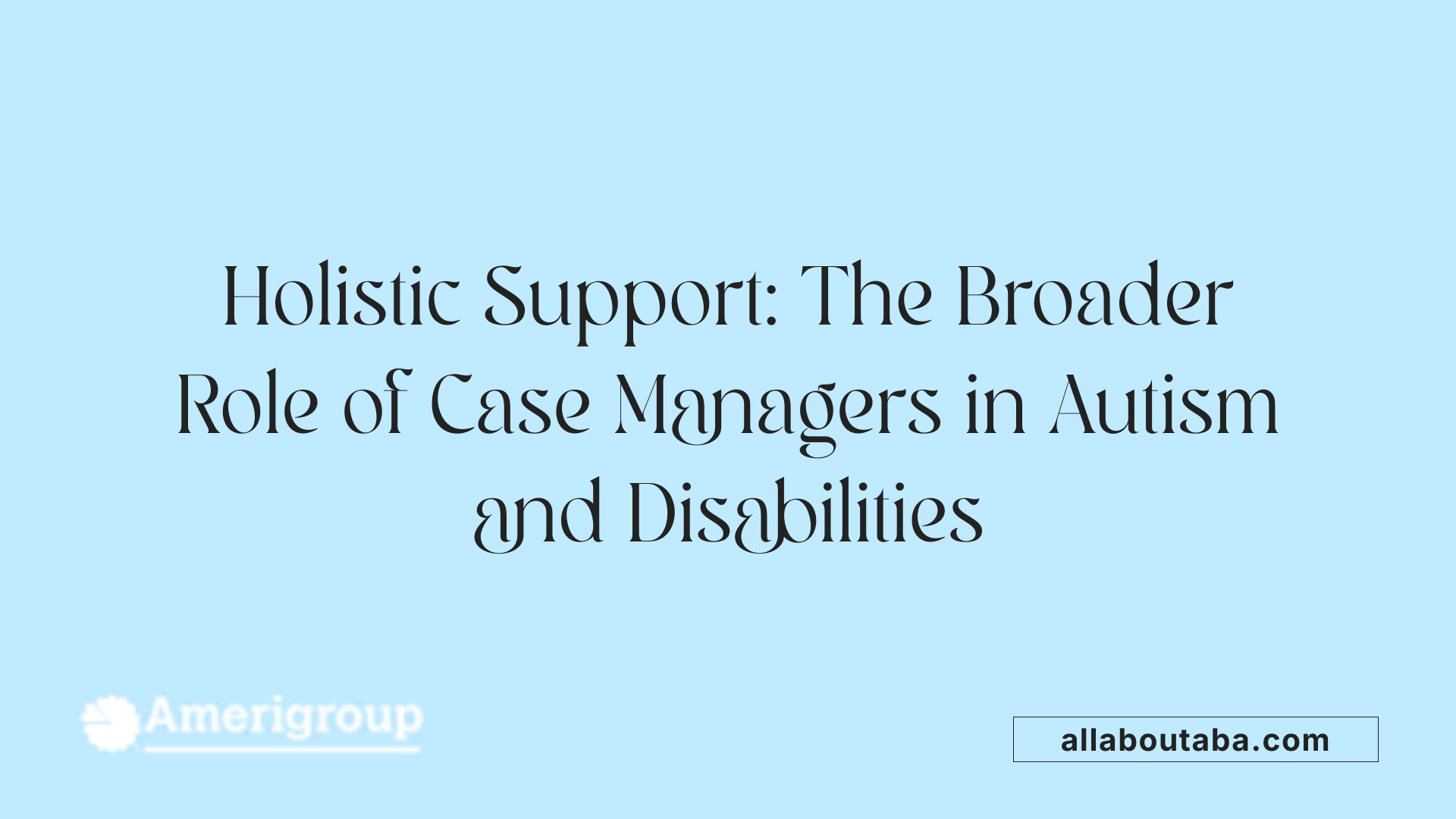Introduction to Autism Life Planning and Care Management
Effective autism life planning hinges on the pivotal role of care managers, professionals who serve as the central coordinators ensuring individuals with autism and their families navigate complex healthcare, educational, and social systems successfully. Their involvement spans from early diagnosis and intervention to adulthood and aging, fostering tailored strategies that promote independence, well-being, and quality of life.
Defining the Scope of Care Manager Responsibilities in Autism

What are the roles and responsibilities of care managers in autism life planning?
Care managers play a central role in supporting individuals with autism throughout their lifespan. They act as coordinators who oversee a wide range of services and ensure that each person’s needs are met comprehensively. Their primary responsibilities include developing personalized care plans, which involve detailed assessments and involving individuals and their families in decision-making.
These professionals gather critical information about the individual’s medical, behavioral, and safety requirements. They coordinate healthcare, legal, financial, and residential services, ensuring smooth communication among providers and providers’ adherence to the care plan. For individuals with autism, particularly those with additional developmental disabilities, this support is essential for navigating complex healthcare and social systems.
Care managers also identify, train, and supervise direct support professionals who assist the individual daily. They monitor the quality of services provided and intervene when adjustments are necessary to optimize outcomes.
How do personalized care plans contribute to effective autism support?
Personalized care plans are tailored to an individual’s developmental stage, strengths, and preferences. By conducting thorough assessments and involving the individual and their support network, care managers ensure that services address both deficits and potentials. These plans guide interventions and community engagement efforts, aiming to foster independence and improve quality of life.
They also include strategies for managing behavioral challenges, supporting communication, and ensuring safety. Continuous review and modification of the care plan help adapt to changing circumstances or progressing needs.
In what ways do service coordination and advocacy manifest in daily care?
Effective service coordination involves managing multiple agencies involved in a person’s care, such as healthcare providers, educational services, and community resources. Care managers serve as advocates, voicing the individual’s preferences and rights, especially in high-stakes situations like hospital stays or transitions between care settings.
They facilitate communication between families and professionals, help resolve conflicts, and ensure that care aligns with the individual’s goals and legal directives. Advocating also means identifying gaps in service provision and working proactively to address them.
How are care managers trained to support professionals and families?
Support professionals, such as Direct Support Professionals (DSPs), require ongoing training to effectively assist individuals with autism. Care managers assess training needs, facilitate skill development, and supervise the professional workforce. Training covers autism-specific behavioral strategies, crisis management, and person-centered planning.
For families, care managers provide education about autism, help interpret medical and behavioral information, and coach caregivers in implementing support strategies. Building capacity within families empowers them to foster greater independence and well-being for their loved ones.
What is the role of care managers in end-of-life and transition support?
Support during transitions—such as from childhood to adulthood or into long-term residential or employment settings—is critical. Care managers assist with planning and executing relocations, including coordinating housing arrangements and organizing necessary supports.
They also facilitate end-of-life planning, helping families and individuals understand options and prepare of advance directives. Throughout these processes, care managers provide emotional support, advocate for the individual’s wishes, and coordinate services to ensure seamless transitions.
| Aspect | Description | Additional Details |
|---|---|---|
| Roles & Responsibilities | Coordinators, advocates, trainers, and planners | Oversee comprehensive service access and quality, support families and individuals |
| Personalized Care Planning | Tailoring plans based on assessments | Incorporates strengths, needs, and individual preferences |
| Service Coordination | Managing agency and provider interactions | Ensures smooth communication and resource sharing |
| Training & Support | Educating and supervising support staff | Focuses on autism-specific strategies |
| Transition & End-of-Life Support | Managing significant life changes | Coordinating moves, facilitating legal and healthcare directives |
Understanding these responsibilities highlights how care managers serve as pivotal figures in creating autism-friendly healthcare and community environments. Their work ensures that individuals with autism receive coordinated, person-centered support that promotes independence, well-being, and fulfillment.
Supporting Individuals at Every Life Stage

How do care managers support individuals with autism throughout different stages of life?
Care managers play a vital role in guiding individuals with autism across all phases of their lives by customizing services to suit their changing needs. Their support begins early, with a focus on facilitating access to therapies and creating developmental plans like Individualized Family Service Plans (IFSPs). These plans promote growth and help families navigate the complexities of early intervention.
As children grow, care managers assist with educational assessments, developing Individualized Education Programs (IEPs), and planning transitions into different educational levels. They connect families with community resources and supports that foster academic achievement and social participation. This continuum of care ensures that children with autism receive tailored support addressing behavioral, developmental, and social challenges.
Moving into adulthood, care managers shift their focus toward promoting independence. They help individuals find suitable employment, secure appropriate housing, and access transportation services and community engagement opportunities. Coordinating healthcare, social, and vocational supports ensures that adults with autism can live meaningful, autonomous lives while maintaining necessary healthcare continuity.
For older adults, the support system adapts again to aging-related needs. Care managers coordinate in-home care services through programs such as the Elderly Waiver, which allows older individuals with autism to remain in community settings. They also work to address barriers like limited healthcare provider awareness of autism in adults and older populations, ensuring ongoing access to necessary services.
Throughout all life stages, care managers serve as advocates, coordinating diverse supports from healthcare to social services, and ensuring a smooth transition as needs evolve. Their comprehensive approach promotes stability, independence, and improved quality of life.
| Life Stage | Key Support Activities | Important Services & Goals | Role of Care Managers |
|---|---|---|---|
| Early Childhood | Developmental assessments, therapy facilitation | Family involvement, early intervention, developmental progress | Develop initial plans, connect families to services |
| School Age | Educational planning, transition supports | Academic success, social skills, community integration | Coordinate assessments, IEPs, transition planning |
| Adulthood | Employment, housing, social participation | Independence, community engagement | Navigate services, advocate, monitor ongoing support |
| Older Adults | Healthcare management, in-home care | Aging in place, health stability | Coordinate healthcare, support aging needs |
What strategies and programs are most effective for supporting individuals with autism today?
Effective support involves a multidisciplinary, person-centered approach that adapts over time. Early diagnosis combined with early intervention programs like Applied Behavioral Analysis (ABA) offer significant benefits. These evidence-based therapies aim to improve behaviors, communication, and self-care skills.
Support programs such as the Horizon Blue Cross Blue Shield of New Jersey's Autism Care Management Program exemplify integrated care management approaches. Such programs include testing, therapy, medication management, and ongoing clinical support, emphasizing collaboration among healthcare providers and continuous data monitoring.
Community resources, support groups such as Autism Speaks, and family education initiatives are critical for emotional and psychosocial support. Case managers help families navigate complex systems—including federal, state, and local programs—to access resources efficiently.
In later life, programs focus on employment, residential adaptations, and health management. Transition planning for adulthood anticipates the need for supportive employment environments and accessible housing, facilitating a smooth move from childhood supports.
| Interventions | Focus Areas | Typical Programs | Role of Support Systems |
|---|---|---|---|
| ABA Therapy | Behavior modification, skill development | Horizon Blue Cross Blue Shield Autism Program | Enhance skills, reduce impairments |
| Community & Family Support | Education, social inclusion | Support groups, parent training, community programs | Engagement, emotional support |
| Transition & Employment | Vocational training, independent living | Supported employment programs, residential facilities | Facilitate independence, promote social roles |
| Healthcare Management | Medical and mental health services | Specialized clinics, care management programs | Continuous health oversight, advocate |
How do modifications in healthcare systems improve experiences for individuals with autism?
Transforming healthcare environments to be more autism-friendly involves environmental design, communication strategies, and staff training. Creating sensory-friendly spaces and reducing environmental stressors help individuals maintain emotional stability during medical visits.
Utilizing tools like hospital passports, personalized care plans, and visual supports enhance communication between patients and healthcare providers. These interventions make healthcare encounters smoother and less distressing.
Behavioral and technological strategies include scheduling dedicated appointments for individuals with autism, using apps or devices to assist understanding, and training staff in autism awareness and sensory sensitivities.
Proactive planning and collaborative, flexible approaches—aligned with patient-centered principles—are essential. These include involving families and individuals in care planning, considering developmental stages, and addressing both medical needs and social supports.
By focusing on tailored interventions and environment modifications, healthcare systems can significantly improve satisfaction, safety, and health outcomes for autistic individuals.
| System Modifications | Techniques & Strategies | Goals | Expected Outcomes |
|---|---|---|---|
| Environmental Design | Sensory-friendly spaces, calming areas | Reduce stress | Increased comfort and cooperation during visits |
| Communication Aids | Visual supports, hospital passports | Improve understanding | Better patient experience and adherence |
| Staff Training | Autism awareness, sensory sensitivity training | Enhance staff competency | More responsive, empathetic care |
| Scheduling & Technology | Dedicated appointments, apps, visual timers | Minimize distress | More efficient, less traumatic encounters |
In summary, comprehensive, adaptable strategies implemented throughout the lifespan and across health systems support individuals with autism in leading healthier, more independent lives. Ongoing collaboration, evidence-based practices, and person-centered planning remain central to successful interventions.
Impact of Care Managers on Care Delivery

How do care managers influence the management and coordination of care for autistic individuals?
Care managers are pivotal in ensuring that autistic individuals receive comprehensive, coordinated, and personalized support across various domains. They act as central figures who facilitate the integration of multiple services, including medical, behavioral, educational, and social supports. By liaising effectively among families, healthcare providers, educators, and community resources, they help create seamless support systems tailored to each individual’s unique needs.
One of their primary roles is navigating complex healthcare and social service systems. These systems often involve federal, state, and local agencies, making their coordination challenging. Care managers streamline this process by assisting families in understanding eligibility, completing paperwork, and accessing specialized treatments like Applied Behavioral Analysis (ABA) and other therapies.
They serve as advocates for clients, ensuring that individual preferences, medical histories, and social circumstances are considered in care planning. This person-centered approach helps secure necessary modifications, accommodations, and interventions that support improved outcomes.
Efficient communication among stakeholders is crucial for successful care delivery. Care managers bridge gaps by maintaining ongoing dialogue with healthcare professionals, schools, and support networks. This continuous information exchange helps prevent delays, address emerging issues promptly, and facilitate timely adjustments to treatment plans.
Supporting families through education and emotional guidance is another fundamental aspect. Care managers provide psychosocial support, helping caregivers manage stress and effectively cope with the demands of autism. They also assist families in identifying and utilizing community resources, support groups, and respite services.
In situations requiring transitions—such as from childhood to adulthood—care managers develop detailed transition plans. They coordinate health services, advocate for appropriate employment and residential supports, and oversee the implementation of care plans, ultimately promoting independence and social participation.
The integration of targeted interventions like environmental modifications, behavioral strategies, and technological tools further enhances personalized care. Care managers ensure these strategies are tailored to developmental stages and individual strengths, fostering an environment where autistic individuals can thrive.
Through these multifaceted roles, care managers significantly improve access to quality care, reduce systemic barriers, and promote positive health and social outcomes for autistic individuals.
How does multidisciplinary service coordination facilitate better healthcare experiences?
Effective multidisciplinary coordination, managed by care managers, ensures that all aspects of an autistic individual’s well-being are addressed cohesively. Teams often include medical professionals, behavioral therapists, educators, and social workers. Care managers facilitate communication and collaboration among these disciplines, preventing fragmented care.
This collaboration enables comprehensive assessment and implementation of treatment plans that consider medical, developmental, emotional, and social factors. It helps in early detection of issues, appropriate intervention planning, and consistent support, which are especially crucial in autism care.
By creating a unified approach, care managers help reduce redundancies, prevent conflicting treatment strategies, and ensure that interventions are aligned with the person's evolving needs.
What strategies support personalized care solutions?
Personalized care solutions are designed around the individual's strengths, developmental stage, and preferences. Care managers play an essential role by conducting thorough assessments, including behavioral, medical, and family environment evaluations.
They develop customized plans that incorporate evidence-based interventions like behavioral therapies, social skills training, and sensory accommodations. Family involvement is prioritized, with shared decision-making guiding treatment adjustments.
In addition, care managers help modify environments—for example, creating sensory-friendly healthcare spaces—and advocate for accommodations during medical encounters. This tailored approach promotes emotional stability, engagement, and better health outcomes.
How do care managers help reduce delays and barriers to care?
Care managers actively identify and address obstacles that delay or hinder access to services. They assist in completing paperwork efficiently, navigating complex referral processes, and understanding eligibility criteria.
Their proactive involvement ensures timely interventions and prevents lapses in care, which are often detrimental in autism management. They also coordinate transportation, interpreter services, or home-based supports when necessary.
By acting as dedicated problem solvers and advocates, care managers facilitate smoother transitions across services and life stages, minimizing disruptions that could impact the individual’s development and well-being.
Supporting Data and Systems in Autism Care
| Aspect | Role of Care Managers | Additional Details |
|---|---|---|
| Multidisciplinary coordination | Serve as central communication hubs | Ensure seamless service integration across health, education, and social sectors |
| Effective communication | Foster ongoing dialogue among stakeholders | Bridge gaps between families, providers, and community supports |
| Advocacy and personalized solutions | Tailor strategies to individual needs | Incorporate strengths, preferences, and environmental modifications |
| Reducing delays and barriers | Streamline access to services | Assist with paperwork, coordinate appointments, and navigate complex systems |
These efforts collectively contribute to more efficient, responsive, and person-centered care, ultimately improving quality of life and health outcomes for autistic individuals.
Strategies and Services Offered by Care Managers
What strategies and services do care managers provide in autism healthcare and life planning?
Care managers play a vital role in supporting individuals with autism by offering a wide array of person-centered services. Their primary goal is to promote dignity, safety, health, and happiness through tailored interventions that address each individual's unique needs.
One of the main interventions coordinated by care managers is behavioral therapy, particularly Applied Behavioral Analysis (ABA). These therapies aim to increase useful behaviors, reduce problematic behaviors, and improve skills such as sleep, hygiene, and self-care. Alongside ABA, care managers facilitate access to developmental therapies like speech therapy and occupational therapy, which help build communication and daily living skills.
In addition to behavioral interventions, care managers develop comprehensive care plans that include regular assessments and adjustments. They ensure strategies are personalized, developmental stage-specific, and aligned with guidelines such as those from NICE. These plans often encompass social skills training, vocational supports, and recreational activities that foster independence and community engagement.
Community and educational resource linkage is another critical service. Care managers assist families and individuals in navigating complex systems including federal, state, and local programs. They help identify suitable residential placements, employment opportunities, and educational supports, advocating for inclusive and sensory-friendly environments.
Creating sensory-optimized settings is essential for maintaining emotional balance in autistic individuals. Care managers collaborate with environmental specialists to modify spaces, reduce sensory overload, and foster comfort and stability.
Supporting social and vocational skills is also a focus. Care managers facilitate connections with community groups such as Autism Speaks or the American Society for Autism, thereby promoting social participation, peer relationships, and employment readiness.
Throughout all these efforts, care managers emphasize approaches rooted in respect for neurodiversity. They prioritize strategies that leverage individual strengths and preferences, avoiding punitive or one-size-fits-all measures. This approach not only enhances quality of life but also supports long-term autonomy across all life phases.
By integrating medical, behavioral, educational, and social strategies, care managers serve as advocates, coordinators, and problem solvers, helping individuals with autism lead more independent and fulfilling lives while ensuring safety and well-being.
Supporting Families of Children with Autism

Why are care managers important in supporting families of children with autism?
Care managers serve as essential advocates and coordinators for families navigating the complex landscape of autism support. They play a crucial role in helping families access comprehensive healthcare, educational, and community services tailored to their child's needs. By conducting thorough family needs assessments, care managers identify specific challenges and resources, providing personalized guidance that simplifies system navigation.
These professionals also focus on reducing parental stress by offering emotional support, education, and empowering families with strategies to manage everyday challenges effectively. Their involvement encourages active participation in treatment planning and decision-making, which is vital for positive outcomes.
Moreover, care managers facilitate smooth transitions across different life stages—from early childhood interventions to adult care services. This continuity ensures that children and their families experience stable and consistent support, fostering long-term development and independence.
Collaboration is at the heart of their approach. Care managers respect families' insights and preferences, working closely as partners to craft and modify care plans that reflect the family's unique circumstances and strengths. Their support extends to advocating for appropriate placements, negotiating with service providers, and assisting with legal or financial arrangements.
In summary, care managers are pivotal in alleviating the emotional burden faced by families, streamlining access to vital resources, and creating nurturing environments that promote the well-being and independence of children with autism. Their holistic approach not only addresses immediate needs but also lays the groundwork for healthier, more resilient families.
Family needs assessment and guidance
Assessing family needs involves understanding medical, social, and emotional requirements. Care managers collect detailed information to develop individualized care plans.
Reducing parental stress and empowerment
Providing education, support groups, and resources helps families feel more confident and less overwhelmed. Empowered parents are better equipped to advocate for their children.
Transition support from early to adult services
Transitions require careful planning to ensure continuity of care, employment opportunities, and community integration for adolescents with autism.
Parent training and psychosocial support
Training sessions and psychosocial services help parents develop effective strategies for managing behaviors, supporting skill development, and maintaining emotional health.
| Aspect | Description | Impact on Family |
|---|---|---|
| Needs Assessment | Evaluating family and child requirements | Tailored interventions, reduced stress |
| Parental Empowerment | Providing knowledge and skills | Increased confidence, active participation |
| Transition Planning | Preparing for life stage changes | Continuity of services, stability |
| Psychosocial Support | Emotional and social support services | Improved mental health, resilience |
More Information Search Queries
To explore further, consider searches related to 'family support services autism,' 'parent guidance autism,' 'transition planning autism families,' and 'psychosocial support for autism families.' These searches can uncover community resources, support networks, and detailed guidance for families managing autism.
This comprehensive support system ensures that families are not alone in their journey, promoting better outcomes for children and fostering family resilience and empowerment.
Involvement in Treatment and Therapy Plans
How are care managers involved in supporting treatment plans such as ABA therapy and clinical support?
Care managers play a vital role in supporting and coordinating comprehensive treatment plans for individuals with autism, including Applied Behavior Analysis (ABA) therapy and other clinical supports. Their involvement starts with thorough assessments to understand each individual's unique needs, medical history, social circumstances, and developmental level. Based on this, they develop personalized care plans that align with the person’s strengths and challenges.
One of the primary responsibilities of care managers is to connect families and individuals to specialized therapies such as ABA. They facilitate access to these services by coordinating with providers, ensuring that therapies are delivered consistently and effectively. Since ABA therapy aims to increase useful behaviors and address problematic ones, care managers monitor progress and collaborate with therapists to evaluate the effectiveness of interventions.
Beyond therapy coordination, care managers assist with medication management when necessary. They ensure that medication plans are integrated into the overall treatment strategy and are adjusted as needed based on ongoing assessments.
Monitoring the outcomes of these interventions is a continuous process. Care managers regularly review progress reports, communicate with clinical professionals, and meet with families to discuss changes or adjustments to the care plan. This ongoing oversight helps guarantee that treatments remain aligned with the individual’s evolving needs and goals.
A crucial aspect of their role involves helping families navigate the complex healthcare system. They assist in accessing insurance coverage, such as Medicaid, and connecting families to community resources and support groups. This navigation ensures that individuals can consistently access the treatments and supports they need.
Care managers also work closely with healthcare providers to facilitate clinical support services, including psychological testing, behavioral therapy, and psychosocial support. By acting as mediators and advocates, they promote coordinated care that leads to improved health and developmental outcomes.
Overall, the involvement of care managers in treatment and therapy plans ensures a seamless, personalized approach. Their work promotes better adherence to therapies, timely adjustments to interventions, and sustained engagement from families and providers, all aimed at enhancing quality of life for individuals with autism.
Broader Functions of Case Managers Supporting Autism and Disabilities

What are the broader functions of case managers supporting individuals with disabilities, including autism?
Case managers play an essential role in supporting individuals with disabilities, including autism, by undertaking a variety of comprehensive functions that address their complex needs. Their work begins with conducting detailed assessments to understand each person’s unique physical, emotional, cognitive, and social requirements.
A primary responsibility of these professionals is to develop individualized care or support plans tailored to the person’s developmental stage and individual strengths. These plans serve as roadmaps for accessing appropriate services and resources.
Coordination and facilitation of services are vital parts of their role. Case managers connect clients with a broad spectrum of supports, such as healthcare, behavioral therapies, educational programs, employment assistance, housing options, and community engagement opportunities. They serve as bridges between families, service providers, and agencies, ensuring clarity and effective communication.
Advocating for clients within complex systems is another significant duty. They represent the interests of individuals with disabilities, helping navigate federal, state, and local programs, including educational and social services. Their advocacy ensures clients receive necessary resources and protections.
Ongoing monitoring is integral to adapt to changing needs over time. Case managers review and revise support plans, facilitate transitions between different care settings or life stages, and guide families through processes like moving into residential facilities or transitioning into adulthood.
Supporting independence and improving quality of life are overarching goals. Through resource linkage, education, psychosocial support, and skill-building activities, case managers aim to foster self-sufficiency and wellbeing.
How do case managers facilitate service planning and coordinate access?
Case managers undertake detailed needs assessments by gathering information from individuals, families, and support networks. These assessments inform personalized plans that prioritize the individual’s goals and preferences.
They then coordinate among multiple service providers to implement these plans, ensuring that services are timely, appropriate, and effective. This includes arranging medical care, behavioral interventions like ABA therapy, housing support, and employment services.
They also monitor the execution of these plans, adjusting them as needs change or new challenges arise. Their proactive approach helps prevent gaps in service and ensures continuous support.
What is the advocacy and resource linkage role of case managers?
Advocacy involves representing clients’ interests within various systems, making sure they obtain deserved services, and defending their rights.
Resource linkage refers to helping families access community resources, programs, and benefits, such as government support, educational accommodations, or employment services. Case managers often assist with applications and paperwork, reducing the complexities families face.
How do case managers support transitions and ongoing care?
Transitions, such as moving from childhood to adulthood or from hospital to home, can be challenging. Case managers prepare families in advance, plan logistics, coordinate moves, and ensure services continue seamlessly.
They also provide ongoing support by regularly reviewing plans, advocating during medical appointments, and adjusting services to reflect evolving needs.
How do they promote independence and improve quality of life?
By providing skill-building opportunities, connecting families with community groups, and supporting safety and self-care, case managers help individuals develop independence.
They work towards creating environments that are accommodating, sensory-friendly, and empowering, ultimately enhancing life satisfaction and social participation.
| Function Area | Main Activities | Affected Areas |
|---|---|---|
| Needs Assessment | Comprehensive evaluation of individual needs | Medical, social, emotional, developmental |
| Service Planning & Coordination | Developing tailored plans, coordinating multi-service access | Healthcare, education, employment, housing |
| Advocacy & Resource Linkage | Navigating and securing resources, supporting rights | Legal, social services, community supports |
| Transitions & Ongoing Support | Managing move logistics, continuous monitoring | Residential, educational, employment pathways |
| Promoting Independence & Quality of Life | Skill development, community engagement | Daily living, social integration, emotional well-being |
Understanding these broad functions emphasizes the vital role case managers have in creating a supportive, accessible, and empowering environment for individuals with autism and other disabilities.
Managing Complex Medical and Support Needs
What is the role of care managers in facilitating comprehensive support and management for individuals with complex medical needs?
Care managers serve a crucial function in supporting individuals with complex health and social requirements. Their primary role is to coordinate a wide array of services—medical treatment, therapeutic interventions, and social supports—to ensure the delivery of holistic, person-centered care.
These professionals, often equipped with backgrounds in nursing, social work, or related fields, conduct detailed assessments of each individual. This includes evaluating health conditions, behavioral challenges, developmental levels, family environments, and social circumstances.
Building strong, trusting relationships is vital. Care managers foster collaboration with families and multidisciplinary teams, establishing communication channels that respect cultural differences and family preferences. Such relationships help in developing customized care plans that address immediate health needs and long-term goals.
Proactive planning is a hallmark of effective care management. This involves designing strategies for transitioning between care settings—such as hospital to home—managing crises, and ensuring continuity of care. For instance, during hospital discharges, care managers coordinate follow-up services, advocate for necessary environmental modifications, and facilitate community resource connections.
In addition to clinical coordination, they connect individuals and families with community support systems like housing programs, employment services, and social groups. These may include organizations such as Autism Speaks or the American Society for Autism, which offer psychosocial support and enable social participation.
Despite systemic barriers—such as limited healthcare settings, rigid funding models, and fragmented systems—care managers work toward overcoming these challenges. They advocate for systemic reforms aimed at integrating services, improving access, and reducing unnecessary healthcare costs.
Overall, care managers act as anchors in complex care scenarios, guiding families through medical, legal, and social landscapes, and ensuring that each individual’s unique needs are addressed comprehensively.
Advancing Autism Care Through Skilled Coordination
In summary, care managers are the cornerstone of effective autism life planning, bridging gaps across systems and ensuring that individuals with autism receive tailored, comprehensive support throughout their lifespan. Their multifaceted roles—from developing personalized care plans and facilitating treatment access to advocating for client rights and supporting families—are vital for fostering independence, community integration, and improved health outcomes. As autism prevalence rises, the importance of well-trained, proactive care management becomes ever more crucial in transforming complex service landscapes into accessible, person-centered pathways that empower individuals with autism to thrive.
References
- Autism-Friendly Healthcare: A Narrative Review of the ...
- Case Manager for Children with Autism Spectrum Disorder
- Basic Management Strategies by Life Cycle for Treatment ...
- Autism Care Management - National Accounts
- Care Managers and How They Support Individuals with ...
- What Do Case Managers Do? Their Role in Supporting ...
- Case Manager for Children with Autism Spectrum Disorder
- Case Management and Autism







